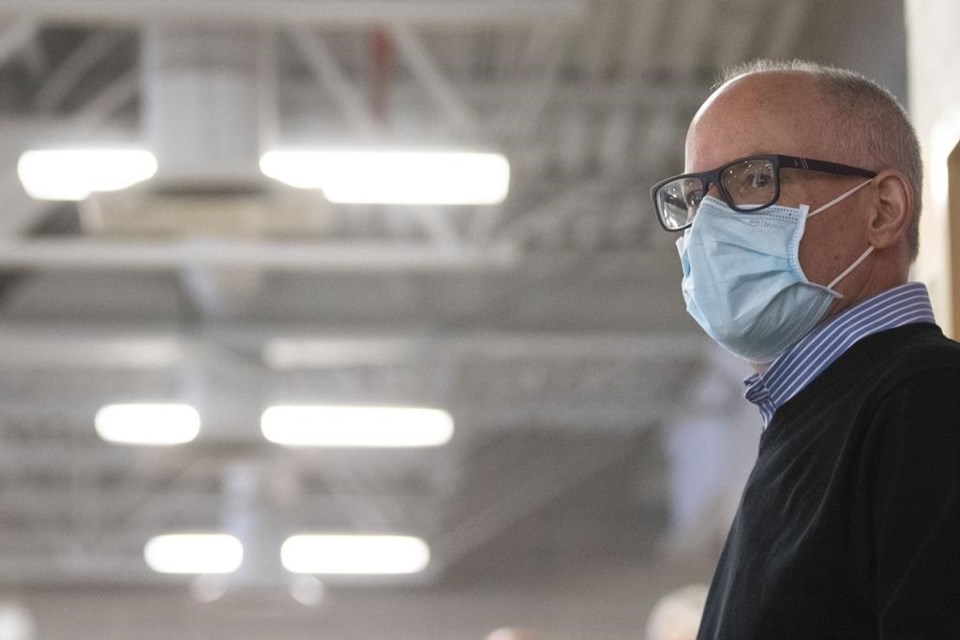The doctor who will guide Ontario's path out of the COVID-19 pandemic is being described by colleagues and friends as a competent public health expert, straight shooter and excellent communicator.
Dr. Kieran Moore, who is currently the medical officer of health for Kingston, Frontenac, Lennox & Addington Public Health, is set to replace Dr. David Williams as Ontario's top doctor on June 26.
The province said it was Moore's success in guiding Kingston and 10 other municipalities throughout the pandemic that led to his hiring.
Bryan Paterson, the mayor of Kingston, Ont., said he never worried about public compliance over tough public health orders because he had "one of the best" in his corner.
"When you ask him a question, he'll give you a straight answer," Paterson said on Monday.
"I think his communication skills are second to none. It's one thing to be an expert and have knowledge, but it's another thing to be able to indicate it in layman's terms."
Paterson credits Moore for pushing the province for a regional approach in lifting its restrictions and has recently been advocating for schools in his region to be able to reopen as soon as possible.
Moore has been at the helm of Kingston, Frontenac, Lennox & Addington Public Health since 2017 and the associate medical officer of health before that since joining the agency in 2011.
He has become known locally for his YouTube videos in which he explains, in plain language, complex medical topics and the reasons behind some of his public health decisions.
He stands in the videos next to a long sheets of paper draped over a white board. Different points are marked by different colours, and he methodically goes through each, like a teacher in front of a class.
"That was very, very successful because when you're pitching to the public, you have to pitch it at a level that everybody can understand," said Dr. Gerald Evans, the medical director of infection prevention and control at Kingston Health Sciences Centre.
The pair have known each other for two decades.
"People loved it," he said.
The mayor said while many challenged him on various orders and initiatives designed to curb, or prevent the spread of COVID-19, the voices got quieter after listening to Moore explain the rationale.
"It's really his ability to just speak to an average person and explain the risks and explain the reason for public health restrictions, I think, has really helped to create that buy-in here locally," Paterson said.
Moore has helped bring in mask-wearing to the region much earlier than the provincial mandate, enforced strict gathering limits designed to stifle massive parties in the city around St. Patrick's Day, and ordered the closure of hair salons after a major COVID-19 outbreak last summer.
"Like a good chess player, Kieran is always looking several plays ahead," said Denis Doyle, the chair of the local board of health.
There are only 11 active cases of COVID-19 in the region that serves nearly 214,000 people. Only three people have died from COVID-19, and, notably, none in long-term care.
Colleagues say Moore is a great choice to lead the province out of the pandemic, in part, because of his varied background.
He spent years as an emergency physician in Kingston and brought his innovative mind to the job, said Evans.
Moore brought in the "emergency department surveillance system" that tracked what patients were coming into hospital with, he said. It was a way to detect, for example, an outbreak of influenza, much more quickly while awaiting lab results.
"It's very, very useful," Evans said.
Moore always wanted to figure out a better way to decrease the numbers he was seeing inside hospitals, and felt he had to move upstream to the public health realm, Evans said.
So he went back to school and completed a master's degree in public health and in disaster medicine.
Many cited Moore's interest in, and aptitude for, being prepared to how well the region has handled the pandemic.
He, along with Evans, helped organize a meeting with more than 100 health-care experts in February 2020 to discuss how to prepare for the looming pandemic.
"He's very collaborative and helped bring together public health people and the local hospital doctors to get them up to speed on the science and what we do about it, and that was an incredibly useful thing," Evans said.
Moore has also worked as a coroner, said Dr. Dirk Huyer, the province's chief coroner.
"He's a smart, passionate, energetic and principle-based guy who is proactive in his approach," Huyer said.
Doyle said Moore has been a tireless advocate on the opioid crisis that has gripped the province in the last half decade.
"We're still focused on the opioid crisis and we recently passed a motion asking the federal government to decriminalize those who use drugs and we see it clearly as a medical problem and not a criminal problem," Doyle said.
"We've had many more deaths in our region due to opioids than COVID-19."
Evans said Moore is the perfect choice to lead the province out of the pandemic.
"He's really quite modest, it's refreshing, and that will help him transition us out of the pandemic, which is going to be a great challenge," he said. "But he's up to the task."
This report by The Canadian Press was first published May 31, 2021.
Liam Casey, The Canadian Press



